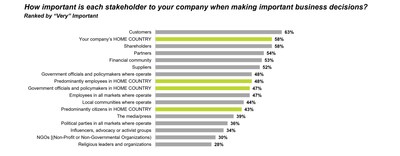58% of Global Executives Say Home Country is a Critical Stakeholder on Par with Customers and Shareholders
According to a global survey by Weber Shandwick, 58% of multinational executives consider their home country a very important stakeholder, ranking just below customers (63%) and on par with shareholders. The study, based on responses from 1,217 executives across 12 countries, reveals that 97% recognize the need for decisions that consider national interests. Additionally, 80% feel companies must prioritize their own success but acknowledge national economic interests should occasionally take precedence. Concerns about geopolitical risks are rising, with 87% of executives agreeing on the necessity to take public stances on such issues.
- 97% of executives believe considering home country interests is important.
- 80% agree that companies must prioritize their own success.
- 87% of executives feel prepared to take public positions on geopolitical issues.
- 74% of executives state their companies are reactive rather than proactive on geopolitical risks.
- 55% find their boards unprepared for geopolitical issues.
NEW YORK, Aug. 3, 2021 /PRNewswire/ -- Nearly six in 10 multinational business executives (
The global survey conducted by Weber Shandwick, in partnership with KRC Research, asked 1,217 senior executives in 12 countries1 about their perceptions of the relationship between a multinational company and its home country, defined as where a company is headquartered, along with the reputational risks and opportunities.
The study reveals that nearly all executives (
"Home country is no longer an unspoken stakeholder," said Michelle Giuda, Executive Vice President of Geopolitical Strategy & Risk at Weber Shandwick. "As corporate leaders reset their strategies for a new geopolitical and post-COVID era, they are considering how they deliver and communicate value to their home country stakeholder. Executives are saying corporate responsibility includes national responsibility, and leaders must plan accordingly."
Fifty-six percent (
Among the list of 16 factors executives were asked to rate by level of importance to company decision-making, national security is top ranked among Indian and Chinese executives, with
What Comes First – Bottom Line or National Interest?
The survey uncovers a striking business challenge. Eight in 10 executives (
The prioritization of company versus country varies across markets and is particularly relevant considering that
Weber Shandwick asked executives to explain in their own words how a multinational company can or should protect or advance its home country's national interests. The top categories of responses include:
- Lead and compete to grow jobs and the economy at home first (
37% ) - Partner with the government – federal, state and local (
17% ) - Protect – data, privacy, technology and intellectual property (
13% ) - Comply with national laws and regulations (
11% ) - Operate ethically (
11% ) - Bolster the image/reputation of your home country abroad (
9% )
Executives Prepare to take a More Public Position on Geopolitical Issues Despite Concern over Risks, Lack of Preparedness
The vast majority of executives (
"Business leaders have been speaking up on domestic issues with increased fervor," said Gail Heimann, CEO of Weber Shandwick. "Now the rising importance of home country and competing national priorities and values is compelling leaders to prepare to raise their voices on international issues and challenging them to choose when to put the company or country first. Our study underscores how central this tension is to our clients' strategies."
The list of issues potentially requiring executives to speak out on is long and complex. Among several geopolitical issues of concern facing multinational companies, executives are most likely to say they are "very" concerned about pandemic/public health crises (
Preparation is imperative since
Principles for Building Reputation Resilience Amid the Rise of the Home Country Stakeholder
Weber Shandwick's Geopolitical Strategy & Risk Group recommends the following guidelines to build reputation resilience amid the rise of the home country stakeholder:
- Know what your national stakeholders expect. Gather the right intelligence to understand how constituencies within your company's home country – including customers, employees, communities, investors, media, and government and local officials alike – expect your industry, company and its leaders to advance or protect the national interest. Incorporate relevant questions into existing surveys or implement new, ongoing polling for comprehensive insights that inform both global and local messaging.
- Anticipate if, how and when you will take a public position on geopolitical issues. Leverage data analytics as well as subject matter expertise for line of sight into emerging geopolitical issues and narratives across the markets and information space in which you operate. Create a framework to assess the issues on which you have a mandate to speak out publicly and plan for when and how it is appropriate to do so. Eighty-nine percent (
89% ) of executives agree –51% "strongly" agree – that geopolitical risks not carefully managed can harm corporate/brand reputation. Ensure communications leaders have a seat at the table alongside the CEO and board members to properly anticipate and prepare for reputation risks and opportunities. - Assess your company versus home country priorities and business risks. Make sure your company has a foreign policy and know how it aligns, or not, with that of its home country. Establish a cross-region, whole enterprise task force with internal and external advisors as a governance mechanism to regularly anticipate the issues that create tension between company and home country priorities. This includes examining the company's exposure in key markets as geopolitical issues arise, and the potential business cost of speaking out or taking action.
- Anchor your actions and message in your values. Fifty-two percent (
52% ) of executives "strongly" agree that their company's core values align with their home country's national values. Proactively demonstrate how these shared or complementary values guide company decision-making and public positions on critical geopolitical issues to best advance or defend your position. - Communicate your national – and international – impact. Showcase ways in which your company is advancing the interests of its home country, in addition to its own financial interests and the company's value-add in all markets of operation. Be mindful of how this impacts the perception of your company across its global footprint. Communications should highlight shared interests and values where possible, while recognizing and managing differences, disagreements and potential conflicts. Diplomacy is required.
- Be mindful of your employees. Employee retention and talent recruitment can be at risk as geopolitical tensions arise. Eight in 10 executives (
82% ) agree that increasing tensions between countries could negatively impact the commitment of employees outside of the company's home country. And77% agree increasing tensions between countries will make it more difficult to recruit talent outside of their company's home country. Work closely with your C-suite officers and local HR heads to consider concerns of non-home country employees.
For more information and to review the full Home Country as Stakeholder report, click here: https://www.webershandwick.com/news/research-finds-home-country-top-three-business-stakeholder
About Weber Shandwick
Weber Shandwick is a leading global communications network that delivers next-generation solutions to brands, businesses and organizations in major markets around the world. Led by world-class strategic and creative thinkers and activators, we have won some of the most prestigious awards in the industry. Weber Shandwick was named to Ad Age's Agency A-List in 2020 and Best Places to Work in 2019. Weber Shandwick was also honored as PRovoke's Global Agency of the Decade in 2020 and PRWeek's Global Agency of the Year in 2015, 2016, 2017 and 2018. The firm has earned more than 135 Lions at the Cannes Lions International Festival of Creativity. Data-led, with earned ideas at the core, the agency deploys leading and emerging technologies to inform strategy, develop critical insights and heighten impact across sectors and specialty areas, including brand and B2B marketing, healthcare marketing, change management, employee engagement, corporate reputation, crisis management, data and analytics, technology, public affairs, social impact and financial communications. Weber Shandwick is part of the Interpublic Group (NYSE: IPG). For more information, visit http://www.webershandwick.com
About KRC Research
KRC Research is a global nonpartisan insights-driven opinion research consultancy that turns data into intelligence to help our clients solve challenges. A unit of the Interpublic Group of Companies (NYSE: IPG), KRC Research offers the quality and custom service of a small firm with the reach of a global organization. Staffed with multidisciplinary research professionals, strategists, and investigators, KRC has worked for over 30 years provide insights to corporations, governments, not-for-profit organizations, and the communications firms that represent them. Our subject matter experts have deep experience in research methods applied to communications, public health and marketing campaigns, corporate and brand reputation, and consumer, stakeholder, and employee engagement. For more information, visit www.krcresearch.com
About the Research Method
Weber Shandwick, in partnership with KRC Research, conducted an online, global multi-market survey among 1,217 multinational business executives in 12 countries between February 18 to April 5, 2021.
All executives surveyed are members of the C-suite or report directly to the C-suite, lead large-sized multinational companies that generate a minimum of
The survey was conducted online in the main languages of each country. We sampled approximately 100 executives in each of the following 12 countries:
Asia | Europe | The Americas |
China (104) India (100) Japan (100) Singapore (101) South Korea (100) | Germany (102) UK (101) Sweden (100) | Brazil (102) Canada (100) Mexico (102) United States (105) |
1 Survey conducted in Brazil, Canada, China, Germany, India, Japan, Mexico, Singapore, South Korea, Sweden, United Kingdom and United States
2 Environmental, Social and Governance
Contact: Jill Tannenbaum
Company: Weber Shandwick
Phone: 212-546-7815
Email: jtannenbaum@webershandwick.com
![]() View original content to download multimedia:https://www.prnewswire.com/news-releases/58-of-global-executives-say-home-country-is-a-critical-stakeholder-on-par-with-customers-and-shareholders-301347119.html
View original content to download multimedia:https://www.prnewswire.com/news-releases/58-of-global-executives-say-home-country-is-a-critical-stakeholder-on-par-with-customers-and-shareholders-301347119.html
SOURCE Weber Shandwick
FAQ
What percentage of executives consider their home country a critical stakeholder?
How many executives believe companies should consider national interests in decisions?
What is the main concern regarding geopolitical risks among executives?
How has the importance of home country interests changed over the years?









